Background
Population diversity is expected to further increase with regard to demographic factors, such as age, gender, migration background, and family status in the near future in Western societies. In tandem with this development, we are witnessing growing inequalities in life expectancy, physical and mental health, educational and employment opportunities, and income and wealth. Moreover, family relations shape individual health and economic well-being, while the meaning of family is constantly changing and diversifying: relationships and networks within families change over the individual life span.
While the potential issues of family diversity and aging for the welfare state, care relationships, and regional disparities are often discussed, the consequences for inequalitiesin health and socioeconomic outcomes are largely ignored despite their critical implications for social cohesion. Within the ECPD, we investigate these pathways and mechanisms under which family diversity is related with inequalities and opportunities in health, educational and socioeconomic outcomes in ageing societies. Knowledge about the complex mechanisms that drive diversity and inequality in a population is of key importance for the future of our societies.
Key Innovations Linking Health and Social Sciences
The ECPD is trying to move beyond a fragmented mono-disciplinary examination of health to develop fundamentally new and integrated biosocial theoretical explanations and methodological models. We merge multiple disciplinary approaches to ask novel questions about how family complexity and changes in family and socioeconomic circumstances influence biology by environment interactions. We aim for a thorough integration of social and biological explanations of inequalities in health and social domains such as education, income, and wealth – all within the environment of growing family diversity. We examine a variety of biomarkers such as allostatic load, body mass index, blood pressure, cholesterol levels, but also genetics and epigenetics. In addition, we explore the biosocial causes and consequences of specific diseases and specific behavioral outcomes.
We study social and health inequalities as dynamically interdependent dimensions connected through mutual feedback effects. For example, understanding the emergence of multimorbidities requires a longitudinal perspective that includes social pathways along the life course. Furthermore, we study health and social inequalities shaped by both intra- and inter-generational spillover effects between family members considering both downward inter-generational effects of (grand)parental on filial generations, and upward inter-generational effects of filial on (grand)parental generations. We pay special attention to compensatory capabilities of families, such as abilities to cope with adverse medical and social events, and prevent spillovers across family members as well as long-lasting “scar” effects.


